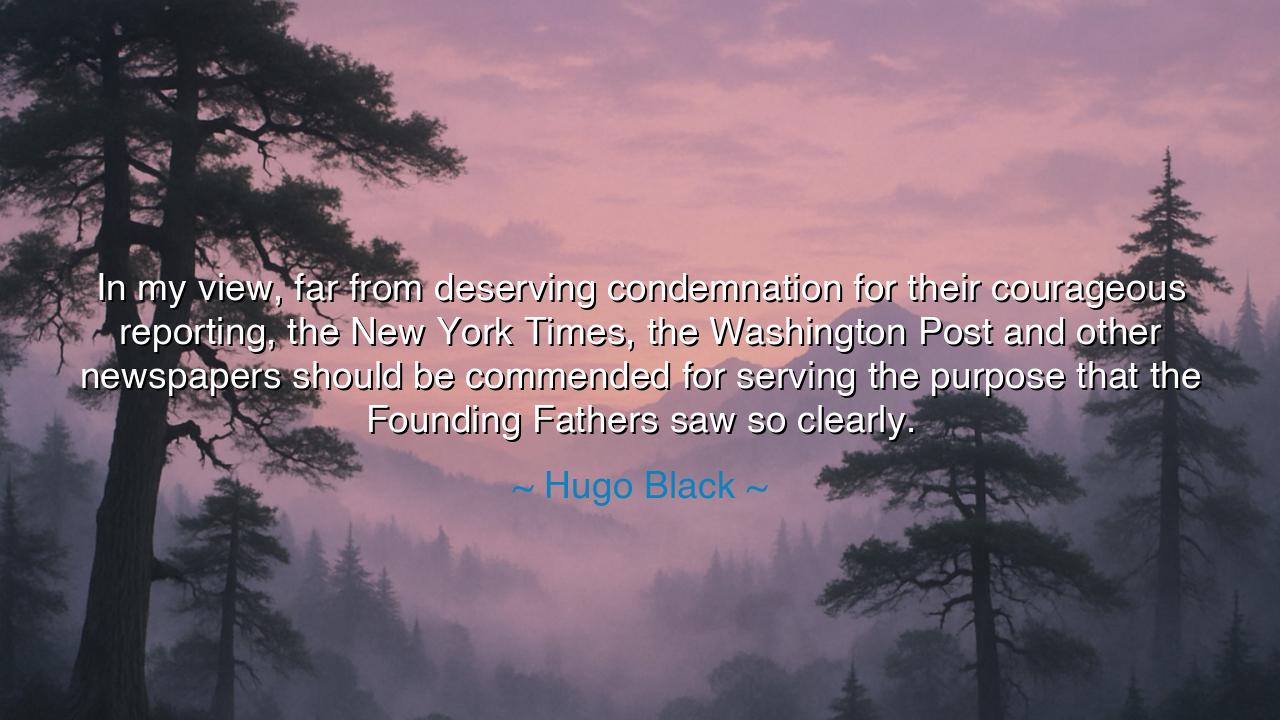
In my view, far from deserving condemnation for their courageous
In my view, far from deserving condemnation for their courageous reporting, the New York Times, the Washington Post and other newspapers should be commended for serving the purpose that the Founding Fathers saw so clearly.






In the steadfast and principled words of Justice Hugo Black, we hear the echo of one of democracy’s oldest and most sacred truths: “In my view, far from deserving condemnation for their courageous reporting, the New York Times, the Washington Post, and other newspapers should be commended for serving the purpose that the Founding Fathers saw so clearly.” These words were not spoken in calm times, but in an hour of trial—when truth itself stood accused, and the guardians of free speech faced the fury of power. Justice Black, a warrior for the First Amendment, spoke not merely as a jurist, but as a prophet of liberty, reminding his nation that the freedom to tell the truth is not a privilege—it is the very breath of a republic.
The origin of this quote lies in the historic case of New York Times Co. v. United States (1971), known to history as the Pentagon Papers case. In those turbulent years, the Vietnam War had divided America, and secret documents—leaked by Daniel Ellsberg—revealed that the government had misled its people about the war’s progress and purpose. When the New York Times and the Washington Post began publishing these truths, the government sought to silence them, claiming that national security was at stake. The matter ascended to the Supreme Court, where Justice Black, unwavering in his conviction, declared that no government, however powerful, may restrain the press from exposing deceit. His words became a torch in the long night of fear and censorship.
To say that the press “served the purpose the Founding Fathers saw so clearly” is to invoke the very spirit of the American Revolution. The framers of the Constitution had lived under kings who silenced dissent, and they knew that tyranny begins not with violence, but with silence—when truth is smothered under the weight of authority. The Founders gave the press freedom not to flatter rulers, but to restrain them, to be the eternal sentinels guarding the people from corruption and secrecy. In Justice Black’s eyes, the journalists of the Pentagon Papers were heirs to that sacred calling. They had chosen courage over comfort, conscience over compliance, and in doing so, had fulfilled the highest duty of a free press.
Consider the peril of those times. The government, embarrassed and enraged, sought injunctions to stop publication, warning of chaos, of danger, of treason. Yet, the truth, like a river, cannot be contained forever. The Supreme Court, by a narrow majority, sided with the newspapers, reaffirming that “the press was to serve the governed, not the governors.” It was a victory not only for the journalists, but for every citizen who believes that knowledge is the shield of liberty. Justice Black’s words stand as a declaration that truth-telling, though costly, is the cornerstone of all that is just and free.
Through the ages, this same battle has played out in many forms. Recall Galileo, who was condemned for speaking the truth about the stars; recall Solzhenitsyn, who unveiled the darkness of the Soviet gulags at great personal risk. The pattern never changes: those who reveal truth often stand alone, accused by those they expose. Yet it is their courage that keeps the light of humanity from being extinguished. So too did the editors of the New York Times and the Washington Post stand in that long line of truth’s defenders, proving that freedom is not given—it is taken, upheld, and renewed by acts of bravery.
The deeper wisdom of Justice Black’s statement is that liberty and accountability are inseparable. A free press is not an ornament of democracy—it is its heartbeat. When it falters, nations drift into darkness; when it thrives, even the powerful must answer to the people. His words remind us that the role of truth is not to comfort, but to confront; not to please, but to purify. He saw that a nation without honest reporting becomes deaf to its conscience and blind to its own decay. The Founding Fathers, in their foresight, built the press as a sword against deception and a shield for the powerless.
And so, my children, learn this eternal lesson: truth is the first duty of freedom. Do not curse those who speak it, even when it cuts deep, for they are the guardians of your liberty. Support those who question authority, for in their questioning lies your protection. Read not only to be entertained, but to be enlightened. Speak not only when it is safe, but when it is necessary. For the press may publish the truth—but it is the courage of the people that keeps that truth alive.
Let Justice Black’s words be remembered not as history, but as commandment: praise those who serve the light of truth, for in their courage lives the promise of democracy itself. If freedom is to endure, the voice of truth must never be silenced, and the people must never cease to listen.






AAdministratorAdministrator
Welcome, honored guests. Please leave a comment, we will respond soon